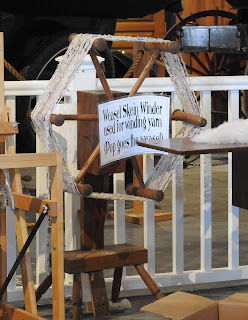Frontier Homestead State Park is right in the heart of
town. This attraction was well worth the
time we spent there. Among the artifacts
is a large collection of very old stage coaches, wagons and farm implements as
well as genuine tiny log cabins and a jail house dating back to the early
1800s. One of the log buildings is a
tiny school house in which there was a stairway up to a second level. This second level was where hay was stored
and the hay served as an insulator during the cold winter months. The jail was occupied by unruly stage coach
passengers and other miscreants who waited there for the marshal to arrive and
deal with them. The last and final
occupant of the jail, it turns out, was a bear.
 |
| Naughty! Stand in the corner! |
 |
| The school house with the hay lift |
 |
| Go to jail, do not pass "go," do not collect $200. |
Outside the entrance to the park sits a massive 250,000
lb. iron ore mining machine. It is
called a SHE 22 and was used as a shovel and excavator of millions of tons of
iron ore in its day. The shovel ran on
electric current, some 23,000 volts supplied by a line attached to a
generator. An operator sat in the small cabin
and was paid 48 cents/hour to drive this monster. Hundreds of these machines were built and
sold around the world. With the arrival
of the railroads, the SHE 22 was decommissioned and now sits proudly on display
here at the museum.
 |
| 250,000 pounds of muscle - the SHE 22 |
 |
| Weasel Skein Winder |
One section of artifacts was devoted to household
implements. In this area were looms,
spinning wheels, an old sewing machine and a device called a Weasel Skein
Winder. The skein winder dates back to
the 1700s and was used to wind wool thread after spinning. The circumference of the wheel is 2 yards and
the internal mechanism is calibrated to count to 40 revolutions, 80 yards of
thread being a skein. When the internal
mechanism popped, 40 revolutions had been completed. Imagine a mom sitting and spinning the wool
into thread and then using the skein winder to wind it into a small bundle, all
the while singing nursery rhymes to the little urchins running circles around
her. It was in the 1700s that the
nursery rhyme was written that ended with the phrase, “Pop goes the weasel!”
The folks were farmers and sheep ranchers. There is a big sheep shearing shed at this
place with individual “booths” equipped with a powered clippers and an adept
hand could shear up to 150 sheep in a day.
The shepherds tended the flocks for days and weeks and followed them as
they moved from one grazing area to another.
The shepherds lived out on the range in “sheep camps,” fully-contained
living quarters with food, water, a stove and a bed. We call these dwellings on wheels the
Granddaddies of Motor Homes.
 |
| The Sheep Camp, forerunner to the Winnebago Forza |
When the Mormons arrived in this area, the land was
heavily treed with what they guessed were cedars although, in reality, there
wasn’t a cedar to be found anywhere reasonably close by. They named their settlement Cedar City and
the name stuck. Here you will find Cedar
Canyon, Cedar Mountain, Cedar Lake, Cedar City and lastly, Cedar Breaks. Cedar Breaks National Monument got its name
in two ways. First the name, “Cedar,” to
preserve the history and tradition of the territory and “Breaks,” a geological
term for a discontinuity in the land mass.
Over millions of years, this spectacular canyon was carved by wind,
rain, snow and rivers and painted many shades of blazing red and purple made up
of deposited layers of oxidized iron and manganese. The stunning colors are emphasized by the
purple mountains on the horizon, the endless blue sky and, at this time of
year, oceans of wildflowers, red, yellow, white and blue. There are hiking trails and overlooks and a
comfortable ridge road on which to drive for fabulous views of the majestic
sharp edges of the towers far below and in the distance. This exquisite monument is just another of
the numerous breathtaking beauties that call Utah their home.
 |
| Cedar Breaks National Monument |











Beautiful!!
ReplyDeleteGreat photos, outstanding scenery and wonderful T-Log! What is your ultimate destination and how long will you be on the road?
ReplyDeletemy kind of town love the word frontier
ReplyDeleteWhat great history and sights! Good for you... And us!
ReplyDelete